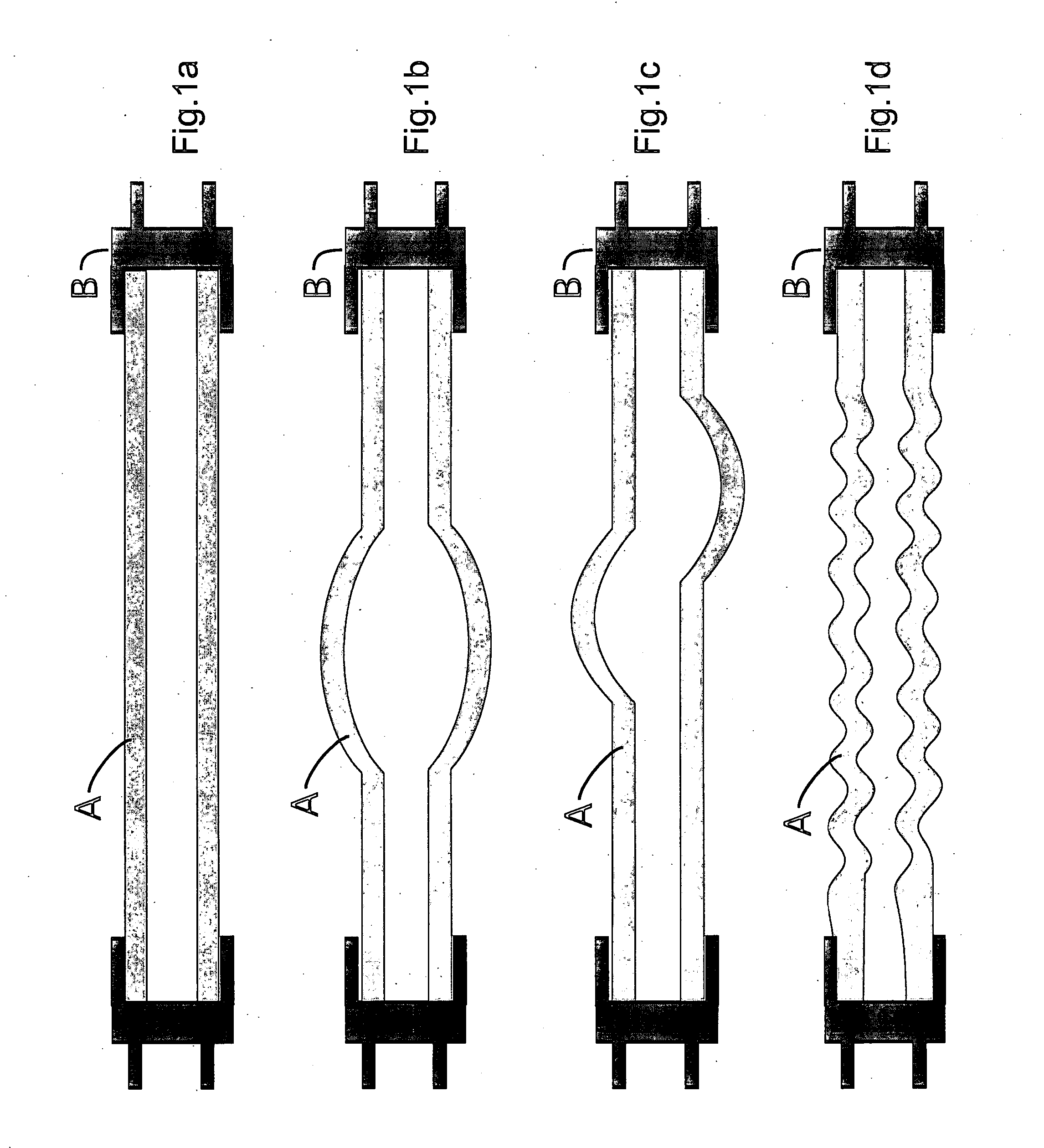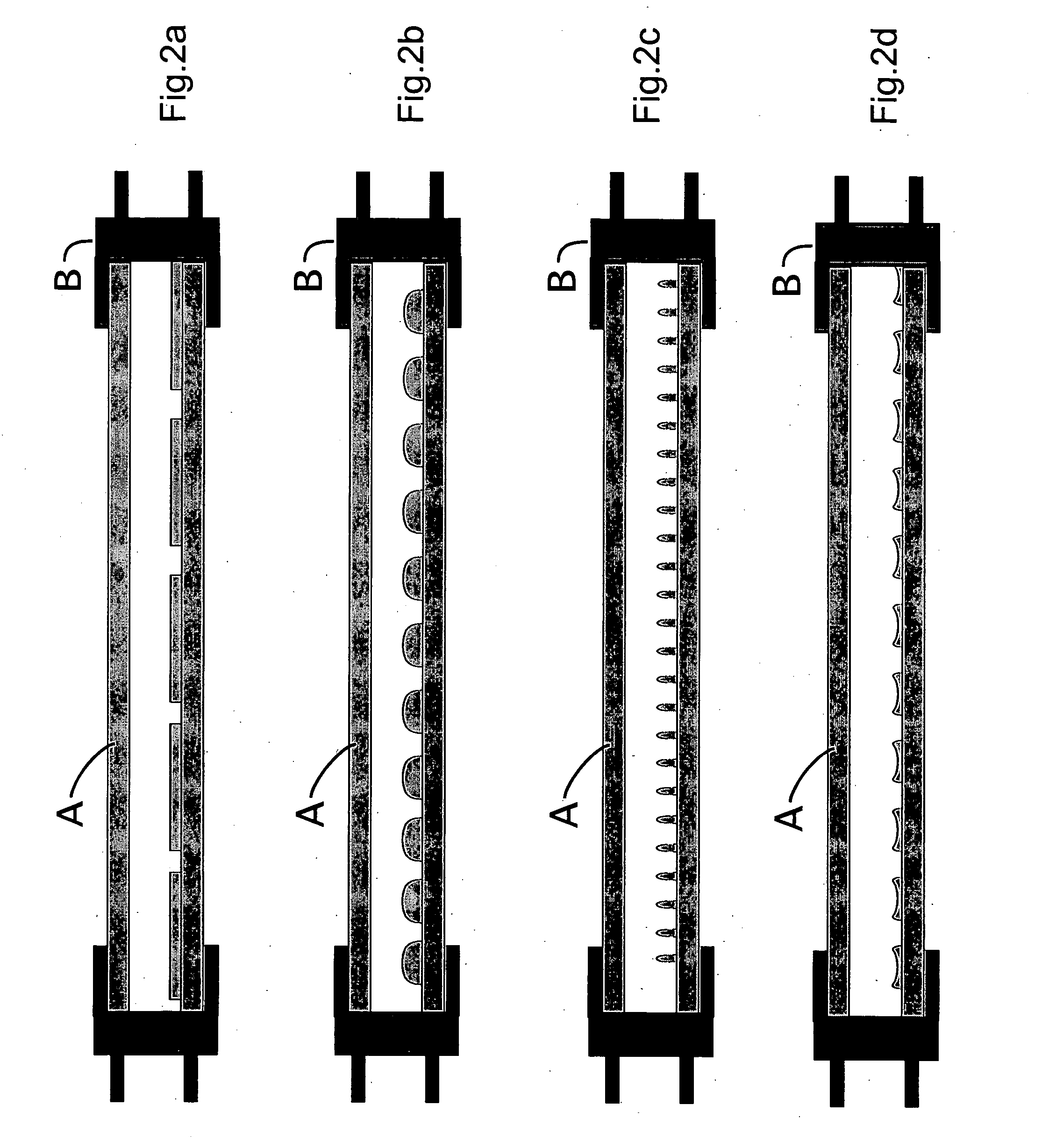Method of producing structures using centrifugal forces
a technology of centrifugal force and manufacturing structure, which is applied in the field of manufacturing structure, can solve the problems of limited size and shape, limited application, and limited material requirements for building structures, and achieve the effect of reducing the surface friction of the structure and enhancing the design application of the structur
- Summary
- Abstract
- Description
- Claims
- Application Information
AI Technical Summary
Benefits of technology
Problems solved by technology
Method used
Image
Examples
example 1
[0134] 2-hydroxyethyl methacrylate (HEMA) was polymerized in the presence of excess water, with a crosslinking agent, preferably, but not limited to ethylene dimethacrylate (EDMA), using a free radical initiating system and preferably an ammonium persulfate (APS) / sodium metabisulfite (SMBS) redox initiating system. A homogeneous mixture, with components detailed in Table 1, was injected into a cylindrical glass mold as described for the process involving 2-hydroxyethyl methacrylate. The homogeneous mixture was made by adding the relevant quantities of HEMA, and water into a glass vial, and mixing in the glass vial. Mixing of the solution was repeated after the appropriate amount of 10% APS solution listed in Table 1 was added. The appropriate volume of 10% SMBS solution was added to this mixture, which was mixed for an additional 30 seconds. The homogeneous monomer mixture was then drawn into a Luer-lok syringe using a 20-gauge needle. The needle was removed from the syringe and, us...
example 2
[0136] A coating with both gel-like and porous morphologies was prepared with the same methodology as Example 1; the monomer mixture used also included poly(ethylene glycol) methacrylate as a comonomer. The monomer mixture and rotation conditions used in Example 2 are listed in Table 1. The resulting porous material / gel-like hybrid coating on the inner surface of the mold is shown in FIGS. 7a and 7b with the outer gel-like coating (the surface that is against the inside of the mold) facing forward in FIG. 7a and the inner porous structure (the one against the water) facing forward in FIG. 7b. The thickness of the coating is approximately 30±5 μm thick. The micrograph in FIGS. 7a and 7b were taken after removing the coating from the glass mold. More specifically, FIG. 7a shows a scanning electron microscope (SEM) micrograph of the outer surface of a porous coating applied to the inside of a glass mold, in which the mixture is 1.9% HEMA, 0.1% PEGMA, 98% water, 0.02% APS, 0.02% SMBS, 2...
example 3
[0137] A porous material can have an outer coating applied to it using this technology. The coating that can be either gel-like or have porous morphology or both was prepared with similar methodology as in Example 1. Prior to the injection of a homogeneous mixture into the mold, a plug of porous material is inserted into the mold (FIG. 8a). Porous PLGA is manufactured using techniques previously described (Holy et al, Biomaterials, 20, 1177-1185, 1999), however the porous material may be made of any material, including polymers, ceramics, metals, composites, or combinations thereof. After insertion of the porous structure into the mold, the homogeneous mixture listed in Table 1 as Example 3 is injected into the mold and the mold rotated at the speed listed in Table 1. The resulting coated porous material removed from the mold is shown in FIG. 8b. There was no coating or blocked pores on the inside of the porous material; the only coating visible was on the outside. This example demo...
PUM
| Property | Measurement | Unit |
|---|---|---|
| internal diameter | aaaaa | aaaaa |
| diameter | aaaaa | aaaaa |
| diameter | aaaaa | aaaaa |
Abstract
Description
Claims
Application Information
 Login to View More
Login to View More - R&D
- Intellectual Property
- Life Sciences
- Materials
- Tech Scout
- Unparalleled Data Quality
- Higher Quality Content
- 60% Fewer Hallucinations
Browse by: Latest US Patents, China's latest patents, Technical Efficacy Thesaurus, Application Domain, Technology Topic, Popular Technical Reports.
© 2025 PatSnap. All rights reserved.Legal|Privacy policy|Modern Slavery Act Transparency Statement|Sitemap|About US| Contact US: help@patsnap.com



